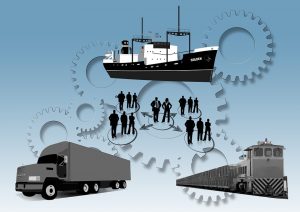6 Reasons BCOs Are Leaving Carrier Contracts for Freight Forwarders & NVOCCs
 The share of shipments in the international shipping industry going to freight forwarders and Non-Vessel-Operating Common Carriers (NVOCC) is increasing.
The share of shipments in the international shipping industry going to freight forwarders and Non-Vessel-Operating Common Carriers (NVOCC) is increasing.
Furthermore, it is not just small to medium shippers, who are not big enough to have direct access to shipping lines, who are importing and exporting through freight forwarders and NVOCCs. Beneficial cargo owners (BCO) are also moving more of their cargo through freight forwarders and NVOCCs.
You may not be a BCO the size of Target, Wal-Mart, or Best Buy, but you may import or export enough cargo to deal directly with carriers. Certainly, cutting out the middle man in transactions seems like a good idea. However, you may want to consider why other BCOs are choosing to forego shipping wholesale to work with an intermediary company when it comes to sailing their cargo.
Here are 6 reasons BCOs are shipping some or all of their cargo through freight forwarders or NVOCCs instead of directly through ocean carriers:
1. To Avoid Unfavorable Contracts
BCOs have traditionally been in win-lose contracts with ocean carriers for importing and exporting their goods. The BCO and carrier would play some kind of high-low gambling game when negotiating contracts relying on projections or sheer guesses of what the extremely volatile freight rates would be on the open market for the upcoming year.
Once the contract was locked into place, someone would win and someone would lose. Either the BCO would get a fixed rate that’s better than what the market freight rates would become and win while its carrier lost or the BCO would pay a higher rate than the spot market averaged for freight movement and lose while the carrier won.
Of course, BCOs lose all too often in this scenario for their liking, especially in recent years when overcapacity was pushing freight rates down to record lows.
To avoid being stuck in bad contracts, where BCOs are paying more than market value for their international shipping, BCOs have hired freight forwarders or NVOCCs to get them the better rates of the spot market.
2. For Flexible Contracts
BCOs can actually be in win-win situations with freight forwarders or NVOCCs by signing ongoing contracts without locking the BCOs into fixed rates.
The contract negotiations between a BCO and carrier can be arduous, and once the deal is set, it’ll typically be a year before carriers will sit down with with them again (unless a carrier wants to get a BCO to pay more than their contracted rates) to hash out a new deal that may or may not be more in line with what’s happening in the industry.
Thanks to new rules issued by the Federal Maritime Commission (FMC) in June of 2018, BCOs can sign very flexible, easily changed contracts with NVOCCs and freight forwarders.
Bill Mongelluzzo reported in the Journal of Commerce (JOC) when the rules were issued:
The Federal Maritime Commission (FMC) Wednesday issued a final rule relieving non-vessel operating common carriers (NVOCCs) from certain filing requirements that interfered with the latter’s ability to respond quickly to the changing needs of their beneficial cargo owner (BCO) customers in today’s fast-paced ocean shipping contracting environment.
…
The FMC is simplifying NVOCC requirements involving two common contracting tools — negotiated rate arrangements (NRAs) and NVOCC service arrangements (NSAs)…. Key provisions in the rule will allow NRAs to be amended at any time, and NRAs will be allowed to address both terms of service as well as freight rates. BCO acceptance of NRA terms will be established by the booking of the shipment….
… “The changes that will be made to NRAs and NSAs will remove impediments on the ability of NVOCCs and their customers to negotiate a single business arrangement that serves the interests of both parties,” said commissioner Rebecca Dye.
Many BCOs find these flexible contracts they sign with freight forwarders or NVOCCs to be much better than win-lose contracts BCOs sign with carriers
3. For Better Customer Service
To say carriers aren’t known for strong customer service would be a major understatement. In fact, Hyundai Merchant Marine (HMM) recently made headlines just for saying it would focus on customer service. It’s no wonder HMM hasn’t been able to turn a quarterly profit since 2012.
At Universal Cargo, it’s hard to imagine running a business without focusing on customer service. As a trusted freight forwarder for over 30 years, Universal Cargo’s focus has always been customer service, which is why we’ve thrived.
In fact, our core CARE values are all about our customer and how we can serve them better: C – Customers, A – Available, R – Resourceful, E – Evolving.
Yet as unimaginable as running a business without focus on customer service seems, it is more the norm when it comes to ocean carriers than the exception.
In a recent Universal Cargo blog post about how pathetic those HMM headlines are, I wrote, “Only in the ocean freight sector of the international shipping industry would a business saying it’s going to focus on customers make headlines.”
I would argue carriers’ focus on what is best for themselves instead of their customers is the biggest factor in their near-pandemic level of profitability struggles over recent years.
4. For Better Reliability
That focus on themselves instead of their customers has helped carriers become notoriously unreliable.
Blank sailings, transhipments, overbooking, roll-overs… I was going to say shippers see all of these things and more from carriers, delaying cargo shipments; however, shippers often don’t see it at all.
Lacking in transparency, carriers commonly do the above things with no warning and all too often without even a notification to shippers. That means cargo can be delayed for days or weeks without shippers having any idea where their cargo is.
Freight forwarders and NVOCCs import and export shippers’ goods through these carriers, so they are also subject to shipping lines’ reliability issues, but BCOs switching to freight forwarders or NVOCCs often find increased reliability because of the switch. Why?
Experienced freight forwarders and NVOCCs work hard and have the know-how to get the smoothest shipment possible for their customers’ cargo. Not only are they paying attention to which carriers are doing a lot of blank sailing and transhipments and on what routes, but freight forwarders and NVOCCs are also monitoring other factors that could disrupt, delay, or prove costly for shippers.
Other factors that could affect shippers’ bottom line in the ocean freight shipping process include but are certainly not limited to dockworker union strife, port congestion, specific port fees, rail and trucking options to and from various ports, international and country specific shipping laws, and improperly filled out or filed paperwork.
It’s not surprising that many BCOs are finding companies focused on what’s best for the shipper through all facets of the shipping process rather than carriers that are focused on doing what’s best for themselves results in better reliability.
5. For Superior Loyalty to Customer
Traditional thinking would make one suppose that a company would be most loyal to its biggest customers. After all, they are its biggest source of revenue. However, carriers do not always show this loyalty to their BCOs.
Especially when the peak season arrives and demand pushes freight rates to their highest, carriers sometimes prioritized the higher priced spot market shipments over the contractually lower priced cargo of their BCOs. Sometimes, carriers even try to renegotiate BCO contracts to get their BCOs to pay more than is contractually obligated.
Mike Wackett reported in the Loadstar:
… 28% of BCOs complained that their provider had attempted to renegotiate their contract during peak season, notwithstanding that they had complied fully with the terms of minimum/maximum quantities.
“During peak season, there’s a scramble to shore up profitability, frequently at the expense of contractual commitments, to the extent of burning relationships,” said Mr Schreiber. “That runs against the more customer-centric path that forwarders and carriers spend much of their time advocating.”
Those burned relationships have helped push BCOs to freight forwarders and NVOCCs.
6. For Additional Services
In the last decade, carriers have made moves like no longer owning and supplying chassis required to move the shipping containers they transport. This example was a cost cutting move by carriers, but it cost shippers through delays, port congestion, and chassis fees.
Many freight forwarders moved in the opposite direction of carriers, looking for services they could add that would further support their customers.
Shippers have always been able to get door to door imports and exports through freight forwarders and NVOCCs, who arrange door to port and port to door trucking and rail for shipments instead of only port to port shipping. In house customs brokers has also been a long staple of freight forwarders and NVOCCs, so the shippers they serve could get their customs clearance handled without having to go to another vender.
Now, there are freight forwarders and NVOCCs adding additional services, like we do here at Universal Cargo with our warehousing services, which provides our customers with the following service options:
- Amazon Prep
- Cross Docking
- Labeling
- Order Fulfillment / Pick & Pack
- Short Term Storage
- Long Term Storage
Conclusion
Freight forwarders and NVOCCs’ international shipping market share is increasing, getting contributions from unsatisfied BCOs leaving carriers.
Bill Mongelluzzo reported in a JOC article in June of last year (2018):
Freight forwarders, also known as non-vessel operating common carriers (NVOCCs), in the first half increased their share of US imports from Asia by 1.7 percentage points from calendar year 2017, according to PIERS, a JOC.com sister product. NVOCCs now control 44.6 percent of containerized imports on the largest US trade lane, up from 36.8 percent in 2013.
…
BCOs more than ever require timely delivery of shipments to satisfy consumer demand in this era of e-commerce, so the rolling of shipments in Asia because of vessel overbooking is working at cross-purposes to their needs. “BCOs are very frustrated about the rolling of freight in Asia, particularly China,” said Jon Slangerup, CEO of American Global Logistics.
If you’re a BCO wanting to see how a focus on customer service can help your business, contact Universal Cargo. You won’t just get our hard working team taking care of you, but you’ll also get an account executive and an operations account manager dedicated to making sure you get personalized, 24/7 service.



